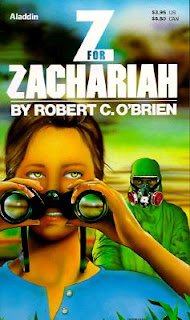The Power of Stories -- Not "Just" Entertainment
"But that's not the way of it in the tales that really mattered, or the ones that stay in the mind. Folk seem to have been just landed in them, usually -- their paths were laid that way, as you put it. But I expect they had lots of chances, like us, of turning back, only they didn't. And if they had, we shouldn't know, because they'd have been forgotten."
-- Samwise Gamgee, The Lord of the Rings, Book IV Chapter 8
In The Two Towers, Sam ponders on the sort of tale he and Frodo have fallen into, comparing it to the ones "that really mattered." For Sam, the stories that really mattered are the ones in which characters press on to the end regardless of their circumstances, and some of them had really horrible circumstances; he mentions Beren facing Morgoth (the first Dark Lord of Middle-earth) and taking one of the Silmarils from Morgoth's crown in a time when no one -- I mean no one -- could be expected to survive such an attempt, much less emerge successful. But Beren went through with it, not because of some foolish pride or bravado, but for the love of Luthien, whose father had set the retrieval of the Silmaril as her bride-price much as Saul had done to David in 1 Samuel 18. As Sam says, if Beren had turned back, he'd likely have been forgotten, along with his love for Luthien.
But what is it that makes a story "really matter"? Does the simple inclusion of a determined protagonist make a story worthwhile?
Actually, I think most stories are worthwhile in the sense that they have power. Stories (in their many forms both written and spoken, filmed, acted, and sung, long and short) are capable of showing us the truths we like to avoid in our everyday lives.
The other day, a friend of mine had a discussion on Facebook about whether video games affect our thought patterns and influence us toward violence. Our Sunday school teacher shared a story about asking his nephew not to play a violent game around his younger son, to which the nephew replied, "It's just a video game."
Whenever I hear the word "just" in the context of stories, I always flash back to this scene from Finding Neverland:
As Johnny Depp, in the form of J. M. Barrie, points out, "just" is often a word we use to make something meaningless, or at least mean less. With stories, especially the visual forms like television shows, movies, and video games, this means we dismiss any power they have to make us think or love or act in a way that's different from before.
But most of us have encountered at least one story that truly matters to us, one that changed us in a way we might not have expected. For Christians, the story of Christ is foremost among those. For me, I would add the Narnian stories, the Lord of the Rings, the Harry Potter series and a museum's worth of others.
But stories aren't limited to the arts. There are also social narratives that affect our ways of thinking. anyone who's watched the news or seen how a particular mindset can be spread throughout a group of people without thought. This type of story is the easiest to fall into, the easiest to be changed by, and often the hardest to discern.
Stories have power, and we shouldn't ignore that. Pretending that they don't doesn't deprive them of the power to change us; it merely makes it easier for stories to change us in subtle, often undesirable ways without our knowing. When we ignore the power of violent stories, we may find we are more susceptible to violent thoughts and actions than if we had paid attention to the stories we experienced and what they were trying to say to us. When we ignore the narratives by which we live our lives, we wind up living by a narrative, a story, that we didn't intend to be part of.
There is no such thing as "just" a story.
But what is it that makes a story "really matter"? Does the simple inclusion of a determined protagonist make a story worthwhile?
Actually, I think most stories are worthwhile in the sense that they have power. Stories (in their many forms both written and spoken, filmed, acted, and sung, long and short) are capable of showing us the truths we like to avoid in our everyday lives.
The other day, a friend of mine had a discussion on Facebook about whether video games affect our thought patterns and influence us toward violence. Our Sunday school teacher shared a story about asking his nephew not to play a violent game around his younger son, to which the nephew replied, "It's just a video game."
Whenever I hear the word "just" in the context of stories, I always flash back to this scene from Finding Neverland:
As Johnny Depp, in the form of J. M. Barrie, points out, "just" is often a word we use to make something meaningless, or at least mean less. With stories, especially the visual forms like television shows, movies, and video games, this means we dismiss any power they have to make us think or love or act in a way that's different from before.
But most of us have encountered at least one story that truly matters to us, one that changed us in a way we might not have expected. For Christians, the story of Christ is foremost among those. For me, I would add the Narnian stories, the Lord of the Rings, the Harry Potter series and a museum's worth of others.
But stories aren't limited to the arts. There are also social narratives that affect our ways of thinking. anyone who's watched the news or seen how a particular mindset can be spread throughout a group of people without thought. This type of story is the easiest to fall into, the easiest to be changed by, and often the hardest to discern.
Stories have power, and we shouldn't ignore that. Pretending that they don't doesn't deprive them of the power to change us; it merely makes it easier for stories to change us in subtle, often undesirable ways without our knowing. When we ignore the power of violent stories, we may find we are more susceptible to violent thoughts and actions than if we had paid attention to the stories we experienced and what they were trying to say to us. When we ignore the narratives by which we live our lives, we wind up living by a narrative, a story, that we didn't intend to be part of.
There is no such thing as "just" a story.



Comments
Post a Comment
What do you think?